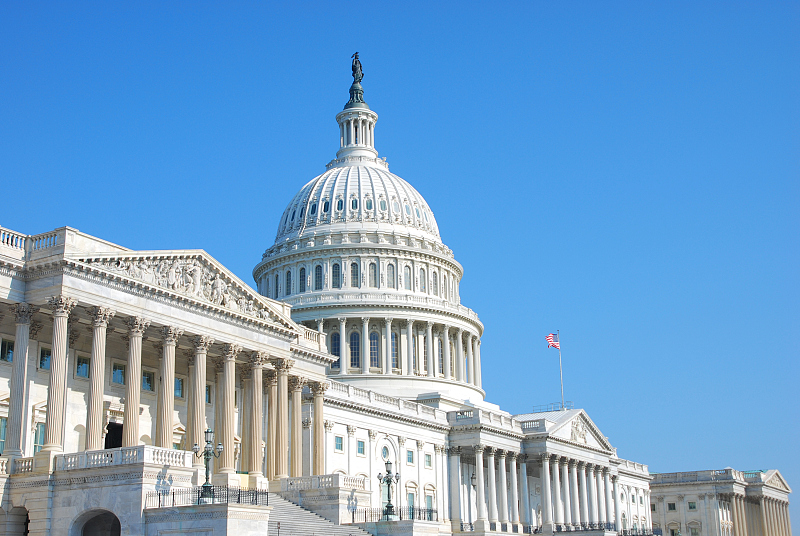
An image of former U.S. President Donald Trump is shown on a screen during the seventh hearing, held by the Select Committee to Investigate the January 6 Attack on the U.S. Capitol, in the Cannon House Office Building in Washington, D.C., U.S. July 12, 2022. /CFP
An image of former U.S. President Donald Trump is shown on a screen during the seventh hearing, held by the Select Committee to Investigate the January 6 Attack on the U.S. Capitol, in the Cannon House Office Building in Washington, D.C., U.S. July 12, 2022. /CFP
Editor's note: Thomas O. Falk is a London-based political analyst and commentator. He holds a Master of Arts in international relations from the University of Birmingham and specializes in U.S. affairs. The article reflects the author's opinions and not necessarily the views of CGTN.
It is well known that the U.S. Republican Party lost its moral compass under Donald Trump. The current revelations by the January 6 committee, which has established a coup attempt by the former president, have mostly been met with crickets by GOP officials. Remember, these individuals swore to protect the Constitution against foreign enemies and domestic adversaries. Yet, the attempt to overthrow the government by Trump and his cronies is an occurrence the GOP will simply accept.
However, not merely the Congressional Republicans have lost their way. In the states, the party has radicalized even more, thereby threatening the Constitutional order. In Texas, for instance, the Republican Party seeks a referendum for secession from the union. More red states will likely follow this model.
All while more than 100 GOP primary candidates in state and federal elections continue to spread the "big lie."
In his latest book "The Next Civil War: Dispatches from the American Future," Canadian journalist Stephen Marche goes as far as to suggest the United States is ending. The only question is how?
He argues that the U.S. could come to be governed by a right-wing dictatorship within the next decade.
That such a scenario is not outside the realms of possibility seems plausible. Imagine Trump or someone else with disdain for the system winning the 2024 presidential election. Yes, Trump ran against various guard rails during his first tenure; institutions such as the Department of Justice or brave Americans such as Brad Raffensperger held the line when Trump attempted to corrupt them for his own benefit. However, by 2024, political operatives and lawyers will have had four years to identify where Trump's plan, which culminated on January 6, failed. So, whoever becomes the next president will possess a roadmap on how to attack America's democracy successfully.

The U.S. Capitol building in Washington, D.C. /CFP
The U.S. Capitol building in Washington, D.C. /CFP
In the worst case, this could equate to quasi-authoritarianism, paired with Constitutional crises, political violence and armed uprisings by the opposite side.
Already, 40 percent of Republican voters and 23 percent of Democrats say violence against the government can sometimes be justified. It is not yet a majority, but the willingness to use violence has increased significantly in recent years, and the political discourse – or lack thereof- plays a significant role.
In a society with paramilitary groups such as the Oath Keepers, the Proud Boys and the Three Percenters roaming the streets and more than 400 million firearms in civilian possession in the U.S., violence can become a sad reality at any time.
And this is not exclusive to America's far-right. As recently as June, a gunman was arrested near Supreme Court Judge Brett Kavanaugh's home while he was planning to assassinate the latter.
Moreover, the country's demographic change is adding fuel to the fire. By 2050, whites could be a minority. For many Americans, this remains a significant issue.
Whereas there used to be conservative and progressive Republicans on the one hand and moderate or progressive Democrats on the other, Republicans is now leaning towards white resentment in the face of growing diversity, while the Democrats have become the party of multiculturalism. Being this irreconcilable opposed to one of the nation's critical questions leaves no room for any improvements.
While such scenarios are grim, it is sadly also plausible, as the damage to the U.S.'s fabric appears irreversible. The more the system crumbles, the less able it becomes to make decisions to avoid collapse. And Democrats and Republicans no longer seem to be able to work out pragmatic solutions and find a consensus. Instead, it's all about portraying the other as an enemy.
In such a volatile climate, a lot is possible. The upcoming midterms and the 2024 election will indicate where the journey for the U.S. goes. Until then, however, the mere fact that secession and civil war have even become part of the debate speaks volumes of how serious the situation has become.
(If you want to contribute and have specific expertise, please contact us at opinions@cgtn.com. Follow @thouse_opinions on Twitter to discover the latest commentaries in the CGTN Opinion Section.)

